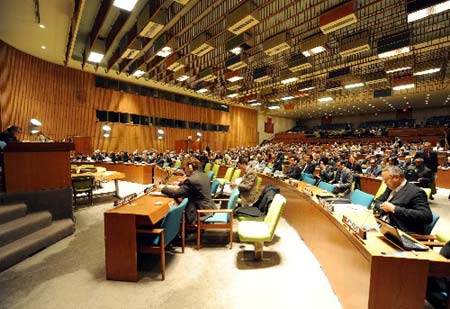 |
|
The UN General Assembly opened on Thursday intergovernmental negotiations on the reform of the Security Council.[Xinhua]
|
No simple solution
Analysts say that a reform of the Security Council is not equivalent to the simple admittance of a few more members.
According to a resolution adopted by the General Assembly last September, the size of an enlarged Council is only one of the key issues to be discussed during the intergovernmental negotiations.
Others include categories of membership, the question of the veto, regional representation, working methods of the Security Council as well as its relationship with the General Assembly.
It is the combination of all the related issues that forms the basis of a reform that would make the Council more representative, accountable and effective.
Since 1979, when the assembly first included the reform of the Security Council into its agenda at the request of ten developing countries, numerous proposals and initiatives have been put forward. Still, no substantive progress has been achieved.
One of the factors that have obstructed progress is regional rivalry, with different interest groups wrangling over what a reformed Council should look like.
In fact, intense competitions have caused a deep division among UN member states.
Therefore, a package solution that serves the interests and concerns of all regional groups and all countries would be favored by most countries against one that simply addresses the membership of a few states.
According to the sketch of a "roadmap" unveiled by General Assembly President Miguel d'Escoto Brockmann, the first round of negotiations will be held in March and April to discuss the key issues related to the Council's reform, with a second round slated for May.
Analysts say that it is unlikely the talks will result in substantive progress any time soon, due to the deep rifts between different regional groups.
(Xinhua News Agency February 20, 2009)